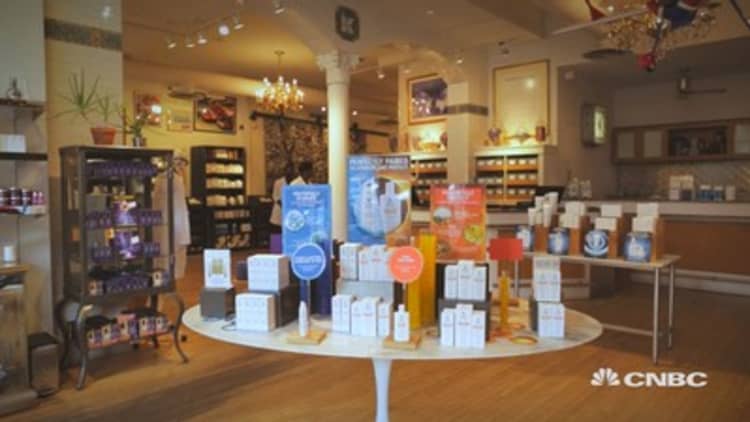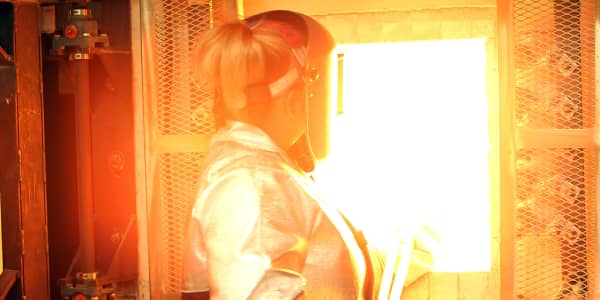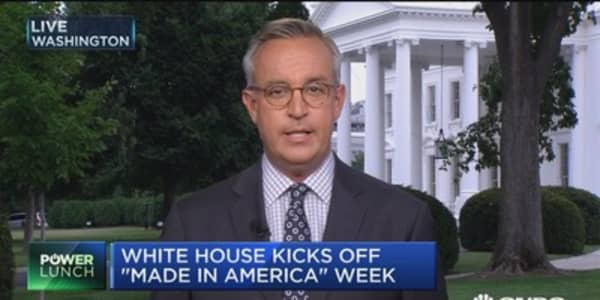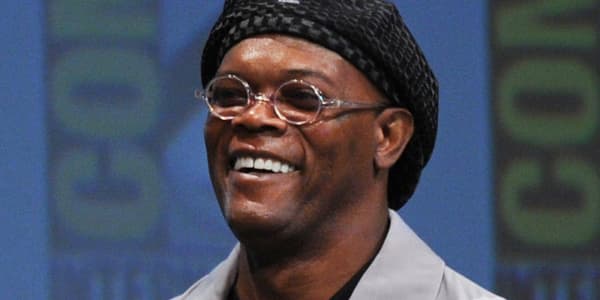
When you first walk into a Kiehl's store, you may be surprised to find motorcycles and a skeleton known as Mr. Bones, but it's all part of the skin-care brand's long history.
"We have been in continuous business since 1851. So to put that into context, we've been around before [Abraham] Lincoln was president," said Chris Salgardo, the president of Kiehl's, which is owned by L'Oreal.
Founded and still headquartered in New York City, Kiehl's has a unique strategy to earn a piece of the skin-care industry, estimated to be worth $39.75 billion by 2015, according to Transparency Market Research. Kiehl's does not reveal sales or market share.
All Kiehl's products sold in the U.S. say Made in the USA, but you won't find it on an ad. The reason? Kiehl's does not do any advertising.
"Regardless of who you are, if you advertise, and to really advertise, you have to spend a lotta money. You're eventually gonna have to pass that cost off to your consumer," Salgardo told CNBC.
Read MoreThe Samuel Adams of whiskey
Instead, Kiehl's relies on its celebrity fans, including Julianne Moore, Pharrell Williams, Oprah Winfrey and word of mouth to promote its products.
"Whenever I meet a celebrity at an event ..., I'm always so honored to hear about all the products that they use and [that] they love Kiehl's," Salgardo said.
Not spending on advertising helps Kiehl's offset its higher U.S. manufacturing costs. They expect to manufacture almost 10 million products globally in 2015.
When Kiehl's realized its gift bags were being made overseas, they switched to manufacturing them at home, even though the price tag was four times higher.
"It's the right thing to do, and you've got to start somewhere until manufacturing becomes larger here," said Salgardo.
Read MoreNew Balance: The US company shaking up the sneakernomics
Kiehl's believes its U.S. manufacturing resonates with its consumers. "When the recession hit … we all were seeing so many jobs go overseas, that 'Made in America' became not only this stamp of really quality, but it was about supporting the country that we live in," Salgardo said.
The skin-care brand also tries to make a difference through its philanthropy.
"Every time I open a store anywhere in the United States, I always find a local charitable initiative that the community believes in to support," Salgardo told CNBC.
Kiehl's has 65 stores in the United States and 400 stores worldwide. They also own a spa and a barber shop in New York City.
Kiehl's and its 1,500 employees raise awareness for AIDS and HIV and Feeding America, which provides meals for those living below the poverty line, among other charities through specially labeled products, the proceeds of which are donated to the charity.
It's a mission Kiehl's president Salgardo personally gets involved in. To raise awareness for AIDS and HIV, Salgardo has ridden more than 8,000 miles on a motorcycle. He plans to ride 2,200 miles, from Denver to San Diego, in August to raise awareness for amfAR, the American Foundation for AIDS Research.
Read MoreThe sport your kid should be doing to be successful
The motorcycle displayed in many of the Kiehl's locations was the brainchild of the company's former owner, Aaron Morse, who brought in his motorcycle and put it on display to keep men entertained while the women shopped. As for the skeleton known as Mr. Bones, he represents the science behind Kiehl's products.
"Mr. Bones has become [our] mascot. What I love about them is that it's really a symbol of the science of Kiehl's, because we have these incredible ingredients that we canvass the world for, for the most highly effective, efficacious ingredients. But you gotta power it up by science to get it to work," Salgardo said.





